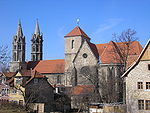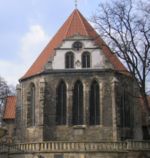Wachsenburggemeinde
Former municipalities in ThuringiaThuringia geography stubs
Wachsenburggemeinde is a former municipality in the district Ilm-Kreis, in Thuringia, Germany. The municipality was named after the Wachsenburg Castle which is located in its center. It consisted of the five villages named Bittstädt, Haarhausen, Holzhausen, Röhrensee, and Sülzenbrücken. Since 31 December 2012, it is part of the municipality Amt Wachsenburg.
Excerpt from the Wikipedia article Wachsenburggemeinde (License: CC BY-SA 3.0, Authors).Wachsenburggemeinde
Am Heiligenberg, Amt Wachsenburg
Geographical coordinates (GPS) Address Nearby Places Show on map
Geographical coordinates (GPS)
| Latitude | Longitude |
|---|---|
| N 50.85 ° | E 10.883333333333 ° |
Address
Am Heiligenberg 24
99334 Amt Wachsenburg
Thuringia, Germany
Open on Google Maps






